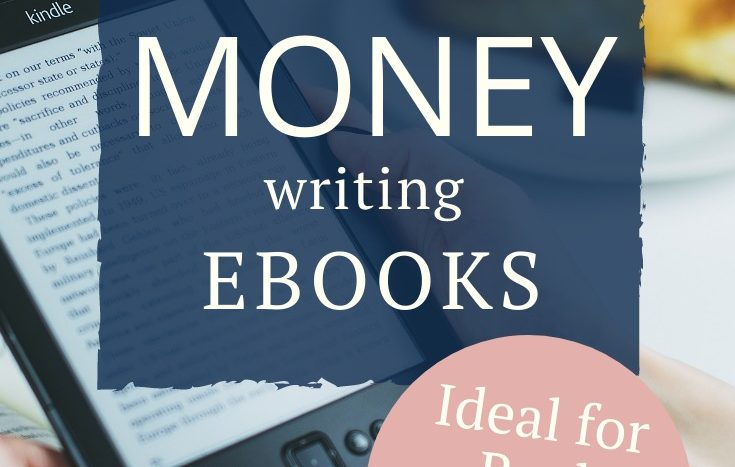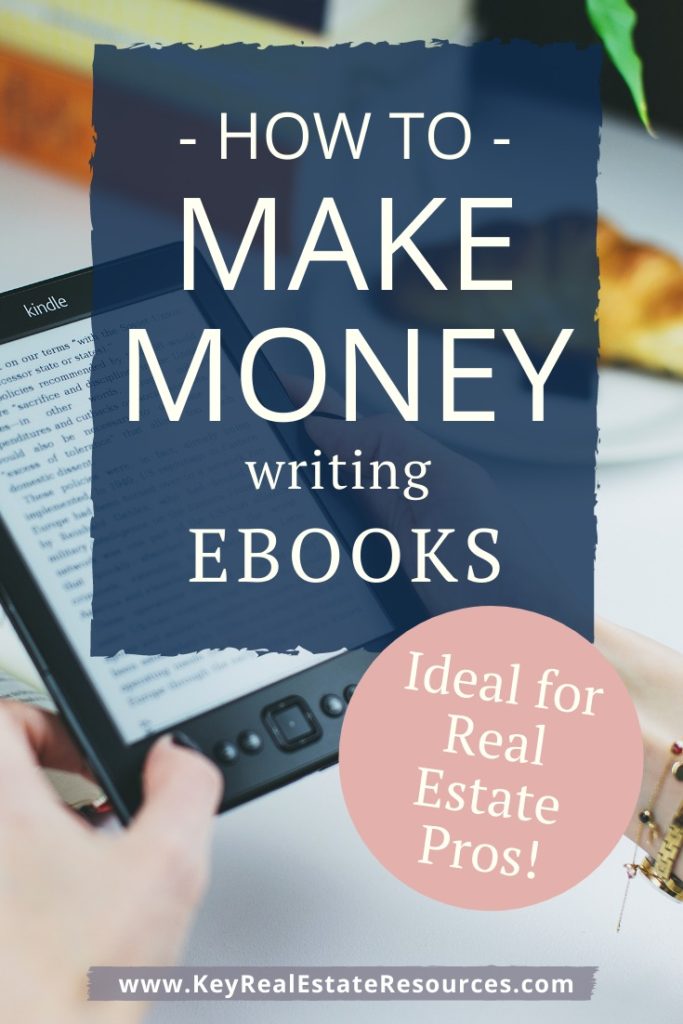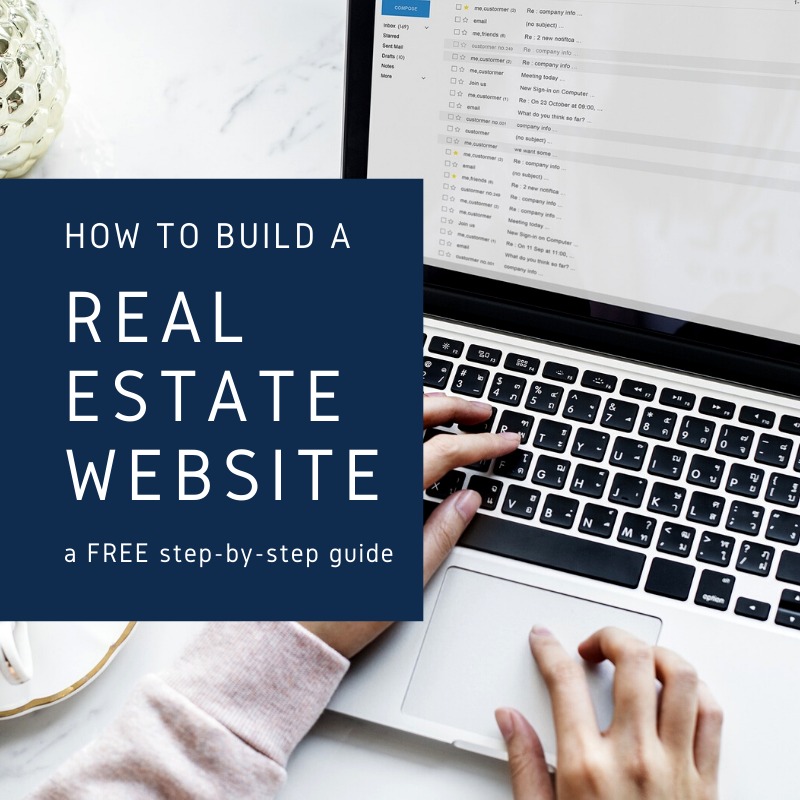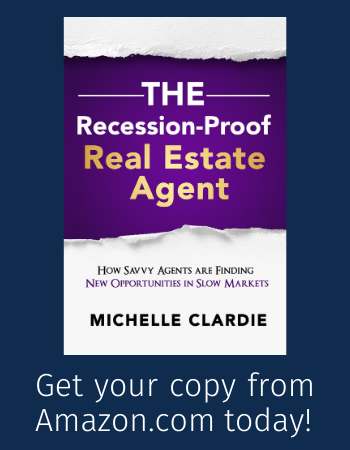The eBook market has exploded over the last decade, and for good reason!
eBooks are an easy way to get valuable information to the masses. They cost little-to-no money to produce. And once published, they can generate passive income for years to come! There’s money to be made in well-written, well-promoted eBooks.
And after we listed eBooks as one of our top 25 ways for real estate agents to add an income stream to their businesses, people wanted to learn more.
So in this post, we’ll discuss how to make money with eBooks.
Why Realtors® Should Add eBooks to Their Businesses
eBooks are a perfect additional stream of income for Realtors® for a few different reasons.
1. They position you as an authority
Authoring a book (yes, even an eBook) indicates expert-level knowledge of your subject. And it provides ample opportunity not only to demonstrate your expertise, but also to help people apply your knowledge to their lives. This serves to position you as an authority in your industry.
2. They earn passive income
As previously mentioned, one of the great benefits of eBooks is the passive income potential. Sure, you invest the time upfront to write and promote the book. And you may continue spending time promoting the book through the years. But you can literally go to sleep one night and wake up with more money in your account the next morning thanks to overnight book sales.
3. They get you more clients
Writing a book can help you reach new clients. First, you could earn the trust and respect of buyers or homeowners in your area, which could make them future clients. You could target certain clients by writing to them specifically. Write a book about the history of your town to reach long-time residents. Write a locals-only guide to your city for newcomers. Or write an eBook on investing to gain new investor-buyers.
Second, your sales page gives Google another page to index, increasing your rank online when people search for agents in your area.
4. They can recession-proof your business
When the market slows and there isn’t much movement, eBooks can bring you income through eBook sales (especially if you’re writing specifically about the market downturn). But they can also bring you new clients.
Write about how (and why!) to buy during a recession to reach buyer-clients. Or write about property taxes to gain property tax appeal clients.
The Basics of How to Make Money with eBooks
What exactly is involved in writing eBooks? The process is actually quite simple:
- Write an eBook
- Publish your eBook
- Promote your eBook
- Collect your income
Simple, yes. Easy? Not exactly.
Step 1: Write your ebook
The writing process is fairly straightforward. Start by creating a well-organized outline (have logical divides between chapters and use plenty of headers and sub-headers to break the information into easily consumable pieces). Then fill in that outline with all your valuable information.
I should also mention that you don’t have to write your eBook yourself. If you have more money than time, hire a ghostwriter to write it for you! I can’t close this section without at least mentioning that I actually offer real estate ghostwriting services! Visit my services and rates page for more information.
Step 2: Publish your ebook
Publishing your eBook can take a little research simply because there are so many different platforms to choose from these days! A popular choice is to self-publish on Amazon. Amazon takes a healthy commission (around 30% in most cases), but they also provide access to buyers and the eCommerce platform for the transaction. If you’re interested in self-publishing on Amazon, check out Richard Abbott’s How to Self-Publish a Book on Amazon and Audible for a step-by-step guide.
Another popular option is to publish your eBook for sale on your website. This can be a highly cost-effective distribution method! And it could increase traffic to your site, which could increase your online visibility, and maybe bring you additional buyers and sellers! You just need to create a sales page on your website and choose an eCommerce/product delivery supplier to accept payment and provide the product to your customers.
By the way, if you don’t yet have a website (or you’re still using your Broker’s site), getting your own website should be priority #1! Your site legitimizes you as a professional and serves as your hub for additional income streams. Check out How to Build a Real Estate Website for completely free step-by-step instructions on building your own website. It’s easier than you might expect, and DYI-ing your site will save you thousands of dollars!
Regardless of which method you choose, you will need to promote your eBook to get eyeballs on it.
Step 3: Promote your ebook
Expect to spend just as much time promoting your book as you spent writing it.
There are lots of ways to do this, but here are some ideas:
- Put banners on your website.
- Consider offering a free chapter via a blog post on your site.
- Promote your book on your social media channels.
- Collaborate with other authors or influencers in your space to reach additional audiences.
- Send an email to your contact list.
Then, assuming you’ve written something buyers are interested in and can find online, you can start collecting from your new income stream. (No need for a whole section on this; the money just shows up in your account!)

5 Keys to Supercharge Your eBooks Income
The eBook market can be highly competitive since literally anyone can write and publish an eBook. So what can you do to stand out and increase your odds of success? Here are the five most important factors in creating eBooks that sell.
1. Niche down.
What do you do when you can’t be heard in the vast expanse of a crowded online market? You niche down.
Instead of competing with all the big-name authors in your general category, get super specific with your topic. You won’t appeal to as many people, but you will resonate with more people.
Consider an example:
You want to write about real estate buying tips. You figure it will help buyers make smarter buying decisions and it could even bring you a few more buyer clients. There are so many well-established authors with popular books on the topic. When choosing between that known author and you…the typical buyer will almost always go with the known author.
But what if you specifically wrote about tips and tricks for buying investment properties in Texas? Your potential audience just shrank substantially. But if I’m a new real estate investor in Texas and have the choice between your book that specifically addresses my exact situation and a generic book written by a known author? You can bet I’m choosing your book! The main benefit is that your book will be much more valuable to your customers; you’ll be able to really help them in a specific way. And a subsequent benefit: you’re more likely to get a buyer client or two since you’ve niched geographically! A few of your readers might just be looking for property in the area you service.
2. Take your reader through a transformation.
Most people who purchase non-fiction aren’t looking for entertainment alone. They want to learn something. But they aren’t actually paying just for the information in the book. They’re paying for the lifestyle change your book can bring them.
In our Texas Investment example, people aren’t buying the book just to learn some tips on the topic. They are buying the book because they intend to use the information in the book to actually invest in Texas real estate. Walk your readers through the process of transforming from their current non-investor state to becoming an investor in Texas real estate.
3. Write what you know as if you were sharing with a friend.
When selecting your niche topic, focus on what you know. One of the benefits of writing a book is to position yourself as the expert. That’s a whole lot easier to do when you really know your subject!
And when you start writing, pretend you’re writing an (incredibly detailed!) email to a friend. Fancy prose is out, and conversation is in. With the increase in blogging as a platform for consuming information, more people want and expect plain English. Nonfiction readers today just aren’t impressed with big words or complicated sentences. You don’t even need to use entirely “proper” grammar. Use short sentences and paragraphs. Sprinkle in the occasional fragment. And feel free to start sentences with conjunctions.
Remember: Your customers bought your book to change their lives in some way, and they want the information on how to do that presented in a straightforward way.
So be friendly and conversational in your writing. Allow your personality to shine through so your readers can make a connection with you while learning how to transform their lives. They’ll feel like they have a friend on their journey, and they’ll be more likely to purchase anything you publish in the future.
4. Write even when you don’t feel like it.
I hear so many stories about agents who start writing an eBook, but have a difficult time finishing because they only write when the mood strikes them. Anyone can be a writer when they feel like it. But if you want to be a real writer (someone who makes money from their writing), you must learn to write when you don’t feel like it.
The good news is that you can usually hit a stride if you just force yourself to start. Like exercise. I used to trick myself into exercising when I really didn’t want to by making a deal with myself: I’ll just do the first 10 minutes of my workout, and if I’m still miserable at that point, I give myself permission to quit. About 95% of the time, I finish my 30-45 minute workout because…meh, I’m already here; might as well finish.
Writing can work the same way. Promise to give it your all for 10 minutes. You’ll probably find that you’re on a bit of a roll by then, and you’ll keep going. And if not, you’re probably not going to turn out anything productive that day, so shelf it and schedule a specific time to come back to it.
One more pro tip to writing when you’re not really feeling it: don’t pause to edit yourself. It’s so easy to bog yourself down in the details until you’re just miserable and stuck. Instead, give yourself the freedom to pour your heart into the writing now and save the editing for later.
5. Promote Strategically
You could write the greatest single resource ever written on your topic, but if people don’t know about it, you’ll still sell zero copies.
It’s your job as a self-published author to promote your eBook.
While we mentioned some tips earlier in this article, here are a few more strategic promotional ideas:
- Give away a few copies in exchange for honest feedback. This provides a few benefits: 1) it gives you a chance to make any revisions needed to incorporate constructive criticism. 2) You might get some solid testimonials you can use in future marketing efforts. And 3) those reviewers might help spread the word about your book to other potential customers.
- Center your marketing efforts around the transformation your readers can expect from your book. Again, learning how to improve their lives is the reason people are going to buy your book, so don’t bury that information.
- Get it all over social media! Take advantage of the free advertising opportunities afforded by social media. This is perfect for anyone with a sizable following. And even if the specific subject doesn’t appeal to your whole social network, you’ll still be boosting your perceived perception as an authority in the real estate world to your entire network.
- Consider paid promotion. If you’re willing and able to spend some money upfront to promote your book, Facebook Ads are a good starting point because you can quickly and easily target your demographic.

How to Start Making Money with eBooks
So where do you start?
Start by brainstorming categories and topics. You can do this yourself by setting a timer for three minutes and listing as many topics as you can think of. Or you can have ChatGPT brainstorm ideas for you.
Then choose the topic you feel will most help your audience. If you have a hard time choosing, remember: you can always write additional books later.
With your topic chosen, create your outline (again, this is a great task for ChatGPT), and start writing!
A word of warning: using artificial intelligence tools like ChatGPT is great for brainstorming and outlining. But don’t try to have ChatGPT write your whole book. ChatGPT is too vague to provide actionable advice for your specific audience. And the book will resonate more if it sounds like you.
Now, if you like the idea of writing eBooks, but you’re a little unsure of your topic, your presentation, or your writing itself, there are a few things you can do to test the waters before diving in:
Hire an editor to review your work.
Editors offer an unbiased outsider’s opinion. The brilliance of getting an editor to review your work is that the editor isn’t inside your head, so they can’t see your vision; they only see what is conveyed by your actual writing. So they can identify gaps between what you mean and what the reader infers.
Editors can offer feedback on your topic, your online, and your writing in general. Consider pausing to hire an editor after you’ve written just one chapter. Their guidance on that chapter could shape your writing of future chapters.
Side note: Editing is not proofreading. Those are 2 different things. Editing is a broad review of the writing for flow and tone, and making sure ideas are properly expressed. Proofreading is the nitty-gritty evaluation of spelling and grammar.
Finding editors online is easy. A simple Google search will give you lots of options. My recommendation is to choose an editor that works specifically with real estate content. They’ll understand cap rates, CMA’s, property taxes, and the mortgage process better than most, so they’ll be better equipped to help you clarify some of the more sophisticated real estate concepts.
For anyone wondering if I also offer professional editing and proofreading services for the real estate industry, why yes, I do! Check out my services and rates page for more information.
Use a short eBook as a lead magnet.
Consider offering a short eBook as a free lead magnet. If you’re unfamiliar with the term, lead magnets are the freebies you offer to give your audience some value upfront. Your reader provides their email address, and you send a pdf to their inbox. It’s a win-win: they get a valuable, totally free eBook, and you get to build your email list.
Offering a short eBook, broadly covering the topic you’d like to really write about in your full eBook will give you a chance to gauge audience interest in the topic. You can also gather feedback from those readers on your organization and writing style. And maybe even get testimonials for your full-scale eBook!
If you are brand new to lead magnets, here’s an introduction to using lead magnets to grow your real estate mailing list.
Want a Real-World Example?
My book, The Recession-Proof Real Estate Agent is now available for order on Amazon. This book offers a complete step-by-step guide to recession-proofing your real estate business. Check it out!
Get a Small Win
Great victories come from small wins. Before you move on with the rest of your day, get a small win!
Today’s small win challenge is to brainstorm topics for your future eBook(s). If you’re having trouble getting started, maybe check our list of 100+ blog topics for Realtors® for inspiration!
All the best to you and your business!












